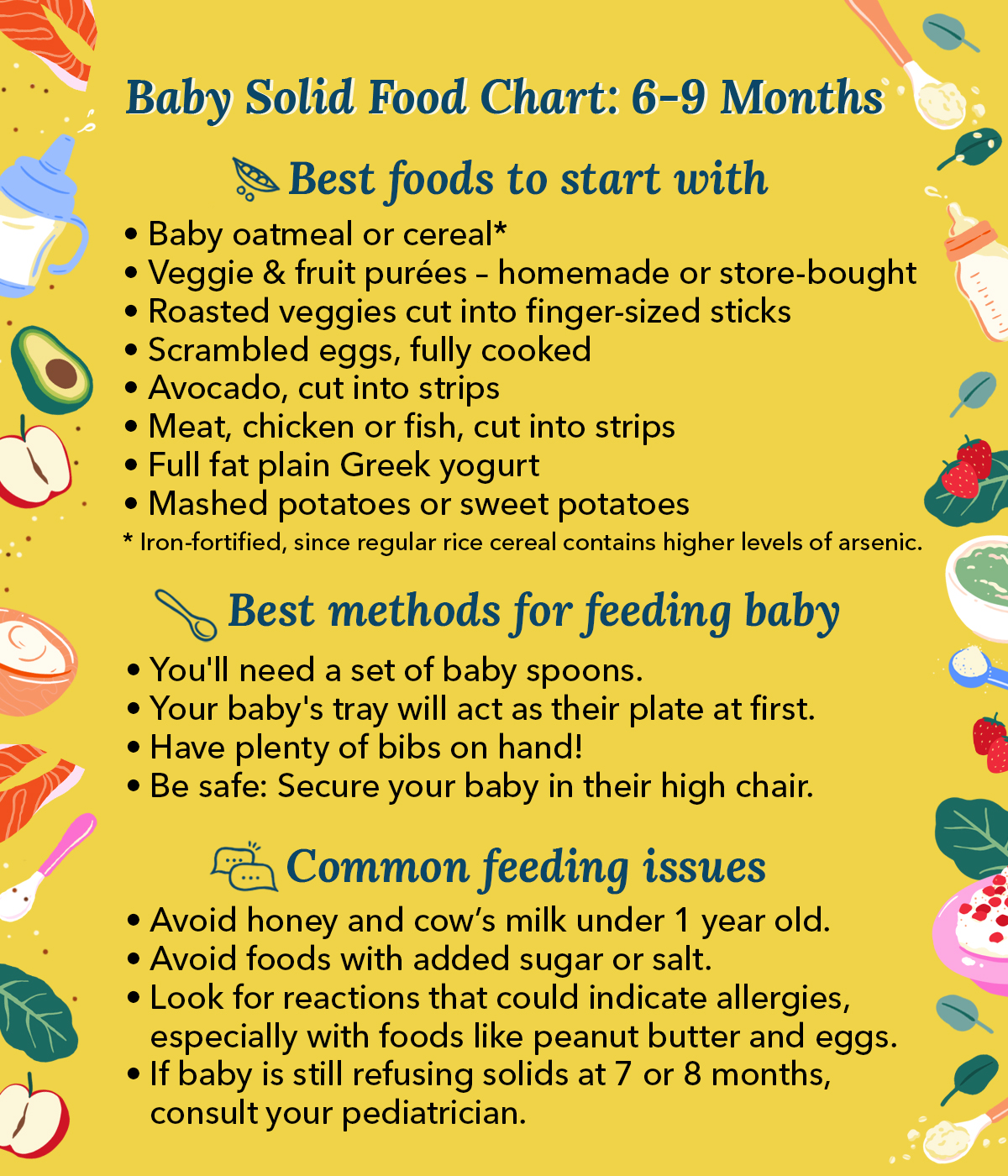
In this article
After getting into the routine of bottles and breastfeeding, branching out into the world of introducing solids can be absolutely overwhelming. Though some parents choose to start earlier (with the blessing of their pediatrician, of course) around six months, baby’s solid food routine will likely begin. This means you’re thinking about a baby solid food feeding schedule, how to make solid foods for baby, and even researching baby meal plans. And what’s the best first solid food for your baby, anyway?
There are a lot of answers to those questions and more. Wanting to demistify the process of introducing solids? Read on!
Solid foods 6-9 Months: How to feed baby

When your baby is showing signs of readiness to start solids — like having good head control and sitting without support — and your pediatrician has signed off, it’s time to start thinking about how to feed your baby and to research the different feeding methods for babies. While some moms choose to go the baby-led weaning (BLW) route, plenty of others begin with traditional purées. Either way is fine, as long as it works for your family.
As far as plates and utensils go, you’ll just need a set of baby spoons to start, since your baby’s tray will act as their plate at first (trust us — it gets messy), as well as plenty of bibs (silicone ones are easy to rinse and reuse, but there are tons out there). And if you plan to make baby food yourself, you’ll also need items like a food processor or blender and some storage as well.
You might be concerned about feeding your baby organic food — which can be more expensive — but according to doctors, it really doesn’t come with much of a benefit.
“In the long term, there is currently no direct evidence that consuming an organic diet leads to improved health or lower risk of disease,” officials from the American Academy of Pediatrics told NBC News.
But what about how to feed baby so they’ll be most receptive to trying new foods? At first, you don’t need to worry about a baby solid food feeding schedule — just seat your baby in their high chair, ideally when they’re in a good mood, and give it a shot. If they’re showing signs of not being interested, like pushing the spoon away, in these early days it can be better to back off and try again later.
Solid foods 6-9 Months: Choosing the best first foods for baby

Ready to get started? Here are some ideas for the best first solid foods for baby:
- Baby oatmeal or cereal
Make sure it’s iron-fortified, since regular rice cereal contains higher levels of arsenic. - Veggie and fruit purées
These can be homemade or store-bought — whatever works for you. - Roasted veggies cut into finger-sized sticks
- Scrambled eggs, fully cooked
- Avocado, cut into strips
- Meat, chicken or fish, cut into strips
- Full fat plain Greek yogurt
- Mashed potatoes or sweet potatoes
At this point, you don’t have to stress about baby nutrition too much. Since your baby’s main source of nutrients and calories is still formula or breastmilk, this is all about introducing new tastes and textures and having fun — baby is already getting what they need!
Solid foods 6-9 Months: Feeding issues and concerns

When baby eats solid food, there are a few don’ts to keep in mind, including foods that aren’t safe. As for what foods not to feed baby, you’ll want to avoid honey under 12 months old, since the bacteria in it can cause infant botulism. You’ll also want to avoid cow’s milk until they’re a year old, as well as added sugar and salt to their foods. Do not feed them — or allow them to get their hands on — anything that is an unsafe shape and could cause them to choke, like grapes or hot dogs.
Other feeding issues that could come up include food allergies, so keep an eye on baby for any reactions when they’re eating allergens like peanut butter and eggs for the first time. And if your baby won’t eat? In the beginning, don’t force it. Just take a break and try again. If you’ve gone full speed ahead on BLW, try purées. If you’re doing purées and baby’s not into it, try BLW. If you reach seven or eight months and baby refuses to take in solids, it’s not a bad idea to contact your pediatrician.
But despite the hiccups that can come up along the way, introducing solids can be a lot of fun, especially for parents who love food.
“If you’re something of a foodie, you probably want your baby to love food too, and one of your best bets is exposing your baby to a wide variety of foods as early as possible,” mom Janssen Bradshaw wrote for Mom.com. “My babies have loved eating curry, soups and stew, tons of fruits and vegetables, bits of meat, and all the yogurt I’ll provide.”
Enjoy this new adventure in motherhood!




